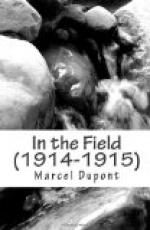But as soon as I got closer to them I found I was mistaken. It was not aged and pious women who were hurrying to the church door, but a group of silent artillerymen wrapped in their large blue caped cloaks. The bells shook out their solemn notes, and seemed to be calling others to come too; and I should have been glad if their voices had been heard, for I was afraid the Chaplain’s appeal would hardly be heeded and that the benches of the little church would be three-parts empty.
But on gently pushing the door open I found at once that my fears were baseless. The church was in fact too small to hold all the soldiers, who had come long before the appointed hour as soon as they heard the bells begin. And now that I had no fears about the church being empty I wondered how I was going to find a place myself. I stood on the doorstep, undecided, on tip-toe, looking over the heads of all those standing men to see whether there was any corner unoccupied where I could enjoy the beauty of the unexpected sight in peace.
The nave was almost dark. The expense of lighting, had no doubt to be considered, for for several days past no candle or taper was to be had for money. And no doubt the kindness of a motorist of the Red Cross had been appealed to for the supply of all the candles which lit up the altar. This was indeed resplendent. The vestry had been ransacked for candlesticks, and the tabernacle was surrounded by a splendid aureole of light. All this increased the touching impression I felt on entering.
Against the brilliant background of the choir stood out the black forms of several hundreds of men standing and looking towards the altar. Absolute silence reigned over the whole congregation of soldiers. And yet no discipline was enforced; there was no superior present to impose a show of devotion. Left to themselves, they all understood what they had to do. They crowded together, waiting in silence and without any impatience for the ceremony to begin.
Suddenly a white figure came towards me through the crowded ranks of soldiers. He extended his arms in token of welcome, and I at once recognised the Chaplain in his surplice. His face was beaming with pleasure, and his eyes shone behind his spectacles. He appeared to be supremely happy.
“This way, Monsieur l’Officier, this way. I have thought of everything. You must have the seat of honour. Follow me.”
I followed the holy man, who elbowed a way for me up the crowded aisle. He had reserved all the choir-stalls for the officers. Before the war they had been occupied, at high mass, by the clergy, the choir, and the principal members of the congregation. He proudly showed me into one of them, and I felt rather embarrassed at finding myself suddenly in a blaze of light between an artillery lieutenant and a surgeon-major.
The low vestry door now opened and a very unexpected procession appeared. In front of a bearded priest walked four artillerymen in uniform. One of them carried a censer, and another the incense-box. The other two walked in front of them, arms crossed and eyes front. The whole procession knelt before the altar with perfect precision, and I saw beneath the priest’s vestments muddy gaiters of the same kind as those worn by the gunners.




